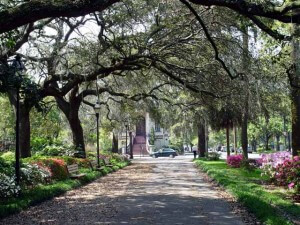Somehow you wake up early, knowing the run is out there, waiting for you. You dress in the dark in the hotel room. Whoever you’re with will still be asleep when you return. Even if you’re alone, you still dress in the dark. Now is not the time for artificial light.
The morning is grey and overcast, but you can still feel the early. In the hotel lobby men and women move forward determinedly in suits and ties, coffee cups in one hand, bag or briefcase in the other. But not you. You alone wear a grubby t-shirt from college, your favorite running pants and brand new Nikes.
Out into the cool air you go, and the run begins.
And this time, the run is in Savannah, Georgia. In the early 1700’s the first European settlers in Savannah laid out a city built around oak-filled squares. Some are impressive, others modest, all have paths and lawns and Spanish Moss and benches and some have statues and fountains and plaques explaining the history of this particular square. Some are surrounded by homes, others churches and inns and restaurants and others still by parking garages and assorted other modern invaders.
The founding fathers of Savannah did not create these squares to foster community or to ensure Savannah’s legacy as one of the most beautiful cities in the South. No, their calling was much more forward thinking. “Three hundred years from now,” they said, “people will be so fat and have so little to do that they will run for no reason other than to get rid of their fat. During this bleak and unfortunate time, these ‘runners’ – as they will be called – will benefit mightily from the incentive these squares will provide. They shall think to themselves, ‘if I just go a little father, I’ll get to see another square.’ And so it is that we shall build these squares, so that we might provide comfort to these pour souls of the future.” The founding fathers of Savannah were both merciful and far-sighted.

Doesn't that make you want to run?
But even in a city bereft of such run incenting squares the first run offers up delicate delights. You move through the landscape but never become a part of it. This is not your town, but someone else’s, and as you go along, too quickly to be spoken to but not so fast as to miss anything, you get to see these someones, see them in their town.
Down in a daylight basement coffee house a man places flowers in the center of the tables. He does not see my feet run pass, he is too intent on his tables, for he knows that the breakfast crowd will be here before he knows it. In the fire station a man wipes down an already gleaming truck, his face is serious, set. Three people, looking weary, wait for the bus, their eyes studiously gaze upon nothing, and certainly not upon me, a stranger in their town.
The morning is for natives, for deliveries and set-up, for work and duty. Not even the dog walkers are up yet. Only the people who must be, the people who belong, the people who run this town are here. Later will come the cars to the point of traffic, visitors to the point of tourists, but right now it’s just me running and the people running the town. Life is made of such simple pleasures.